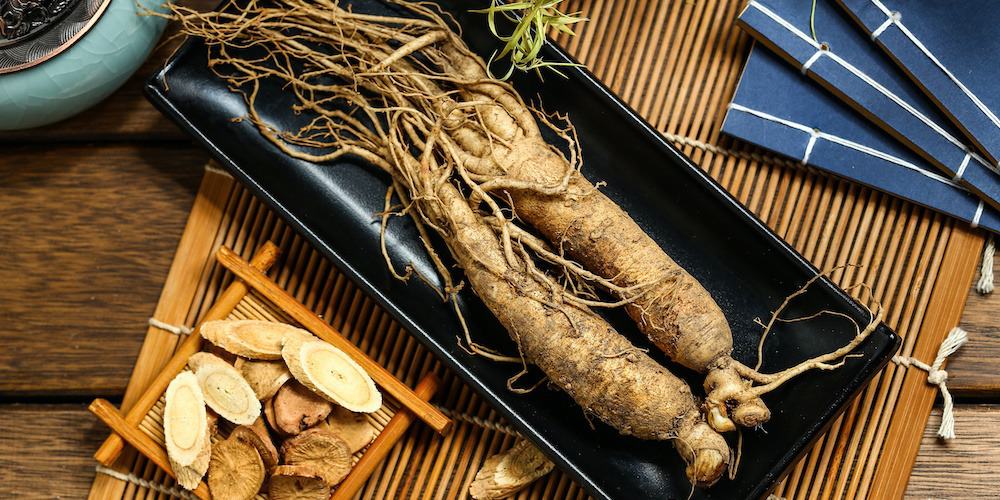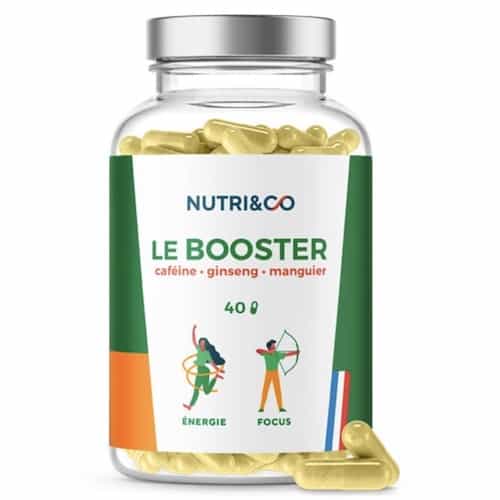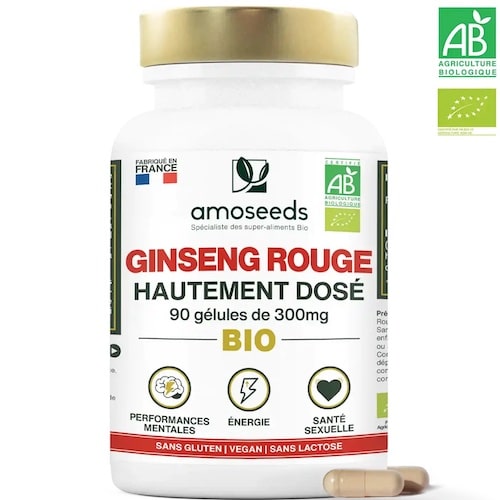We analyzed 10 products sold online based on 5 criteria, and selected these 3 ginseng supplements:
# Best Ginseng Complex: The Booster – Nutri&Co
# Best Value for Money: Highly Dosed Red Ginseng – Amoseeds
# Best Premium Ginseng: Premium Red Ginseng – Dynveo
Best Ginseng Supplements
Our Selection Criteria
- Ginsenoside Content: Ginseng contains more than 50 different ginsenosides: they are behind most of its benefits. A high content allows for optimal effectiveness with a reduced number of capsules per day.
- Certificate of Analysis: verification of no contamination, heavy metals, or suspicious solvents.
- Price / Day: this is the daily cost of the cure at the recommended daily dose by the brand.
- Customer Reviews: these reviews are taken from specialized platforms such as TrustPilot or Ekomi.
- Our Opinion on the Brand: following the tests of dietary supplement brands that we conduct each month.
All selected products are made in France and without excipients. All capsules are 100% plant-based.
Best Ginseng Complex
Marque : Nutri&co
Taux ginsénosides : 7%
Certificat d’analyse : conforme
Prix / jour : 1,2 €
Avis clients : 4,8/5
Autre : contient en plus de la caféine et de l’extrait de feuille de manguier.
This supplement contains 3 stimulating products for synergistic action: very high-quality white ginseng, caffeine, and a patented extract concentrated at over 60% mangiferin.
Unlike other similar supplements, the ginseng used has been validated by more than 40 clinical studies. And it offers a very wide spectrum of ginsenosides.
Caffeine acts quickly, and white ginseng prolongs the energy boost without a crash. It is delivered by a combination of extracts from coffee, maca, guarana, green tea, and yerba mate. Be careful, one capsule equals one cup of espresso!
The Nutri&Co brand is based in Aix en Provence and places special emphasis on product transparency (presence of analysis certificates on the website) and ingredient quality (without controversial excipients, eco-responsibility).
Our full review on Nutri&Co is available here.

Maxime Mességué
Dietitian-Nutritionist

Attention à choisir un ginseng titré à au moins 5 % de ginsénosides pour une efficacité optimale. Le ginseng se prend de préférence le matin à jeun avant le petit déjeuner.
Best Value for Money
Brand: Amoseeds
Ginsenoside Content: 8%
Certificate of Analysis: compliant
Price / Day: €0.22
Customer Reviews: 4.5/5
Other: organic label
Amoseed’s red ginseng offers an excellent value for money, with a sufficient concentration in ginsenosides.
The capsules are plant-based (HPMC), and a box of 90 capsules lasts 3 months.
Amoseeds is a French brand specializing in superfoods and plant-based supplements.
The products are offered in their raw form or as capsules and powders. They are organic, guaranteed additive-free and preservative-free.
Best Premium Ginseng
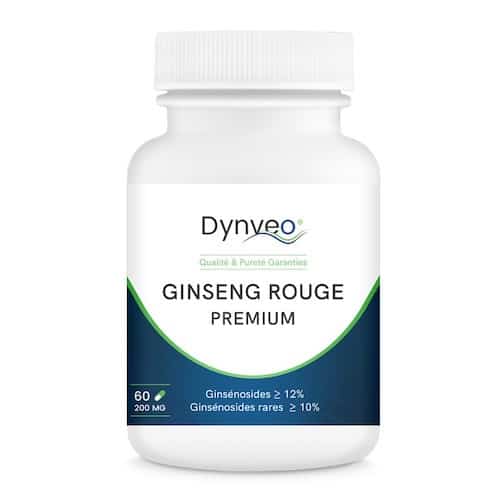
✪✪✪✪✪
Darwin Nutrition®
Brand: Dynveo
Ginsenoside content: 12%
Certificate of Analysis : compliant
Price / day: 1.5€
Customer reviews : 4.8/5
Other: organic label
We chose this ginseng because it is pure, well standardized in ginsenosides and also offers a good spectrum of bioactive molecules.
The extract is 100% pure and comes from sustainable soilless production. It is standardized to 6% in ginsans, at least 12% in classic ginsenosides including at least 10% in rare ginsenosides.
Dynveo is a dietary supplement laboratory known for the concentration of active ingredients in its products. We have tested and approved its after-sales service, which is responsive and relevant (read our full test here to find out more).
What are the benefits of ginseng?
A stimulating aphrodisiac root
The ginseng (Panax ginseng) is a plant originating from Asia. It produces a rhizome used in herbal medicine and traditional Chinese medicine. Indeed, it has an aphrodisiac action that allows to boost libido.
It also fights against fatigue (physical or mental) and increases physical performance. Finally, it strengthens the immune system, thus improving the body’s resistance to infections. In general, ginseng is a powerful stimulating plant.
A promising study lasting 4 months, conducted on 45 patients in a double-blind (placebo-controlled) setup, observed in 60% of patients a improvement in erectile dysfunction with an overall satisfaction of 60% after 4 months of taking red ginseng (300 mg 3 times a day). However, quality studies are lacking to validate this effect.
Action on immunity
It strengthens the immune system, thus improving the body’s resistance to infections.
A clinical trial indicates that taking 100 mg of standardized ginseng for 3 months, combined with a flu vaccination, very significantly reduced flu or cold cases compared to those who did not take it.
A root that is both stimulating and relaxing
In general, ginseng is a powerful stimulating plant.
WHO (World Health Organization) validates as “clinically established” the use of ginseng to optimize physical and mental abilities in case of fatigue and convalescence.
An analysis of 12 controlled trials involving 1298 patients concluded that ginseng has a significant effect on reducing disease-related fatigue.
Ginseng is called an adaptogenic plant: it increases the body’s ability to adapt to stress and facilitates the return to balance: clinical studies indicate that when combined with multivitamins, ginseng may improve the quality of life of people exposed to the stress of high physical and mental activity.
Its anti-stress properties have been studied in menopausal women: taking 3 g of ginseng in 72 menopausal women significantly reduced menopause symptoms (notably hot flashes, nervousness, depressive mood, fatigue).
Cardiovascular risk factors were also lowered.

Maxime Mességué
Dietitian-Nutritionist

Les ginsenosides qu’il contient permettent de lutter contre la fatigue, le stress et stimulent le système immunitaire.
An antioxidant and anti-inflammatory action
The root of ginseng contains active substances called “ginsenosides“. They are partly responsible for its benefits.
Research has shown that they also exert an antioxidant and anti-inflammatory action.
As shown in this study, ginseng consumption helps regulate the body’s inflammatory response. At the same time, it increases the antioxidant capacity of cells to reduce inflammation triggered by oxidative stress.

A hypoglycemic action
There are a few studies on the usefulness of ginseng in prediabetes or in combination with well-controlled type II diabetes.
In a placebo-controlled study, taking 2 grams of ginseng 3 times a day for 3 months in type II diabetics reduced blood glucose and insulin levels, while maintaining good glycemic control (blood sugar levels).
Where to buy ginseng?
Organic stores
Many organic stores, such as Naturalia or Biocoop, offer ginseng grown through organic farming.
Pharmacies and parapharmacies
In pharmacies and parapharmacies, ginseng is available in capsules, ampoules, or powder. It can be alone or combined with other stimulating plants like guarana or maca.
Specialized physical stores
Retailers of dietary supplements and health food stores often sell ginseng in capsules, powder, or ampoules. You can also find whole or cut roots in herbal shops.
Online stores and specialized e-commerce
On the Internet, ginseng is available in all its forms: capsules, powder, ampoules, paste extract, fresh roots… Prefer organic shops like Kazidomi or La Fourche. Also, check out retailers, laboratories, and brands of dietary supplements like Natura Force or Nutri&Co.
Producers
In France, ginseng cultivation is not well developed. However, in the southwest of the country, some producers are starting to get involved. They cultivate, harvest, and process the roots. If possible, choose locally grown ginseng.
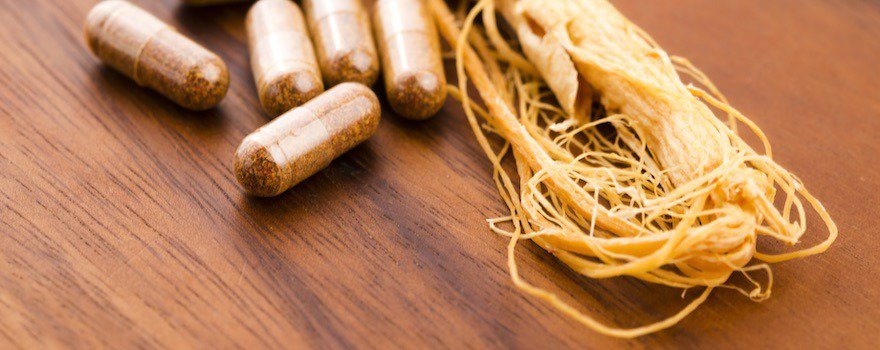
In what form?
In capsules and tablets
Ginseng capsules and tablets are made from rhizomes reduced to powder. It’s an easy-to-find format, practical and quick to take. Additionally, it doesn’t have the intense and acrid taste of ginseng root that can be hard to consume.
The quality is variable, especially for tablets: it depends on the excipients added to improve the taste.
In powder
It can be sprinkled on salads, added to yogurt, or mixed into a drink (water, tea, coffee). It has a fairly strong and bitter taste that can be softened with sugar, honey or lucuma powder.
It is more challenging to find the mention of ginsenoside levels for these forms, so the quality is not always guaranteed.
In ampoules
The ampoules contain aqueous extract of ginseng roots and are well standardized in active substances. Easy to take, they simply dissolve in a large glass of water.
However, they are rarely composed of 100% ginseng. They are often combined with royal jelly, guarana, ginger… They can also contain other ingredients like fruit juice, for example.
In roots
The roots are fresh or dried. They can be chewed directly or used in cooking.
They have the advantage of not undergoing any chemical processing, but the strong taste can be off-putting for some. They pair well with vegetables, meat… and add flavor to soups.
In paste extract
Ginseng paste extract is commonly used in Asia. It takes the form of a fairly thick paste and is highly concentrated in ginsenosides. It can be consumed pure or mixed with a hot drink or water.
In tea
Fresh root infusion is possible, in boiling water for a few minutes. For a more pronounced effect, decoction is preferred, with an infusion time of ten to fifteen minutes by default, and several hours if possible.
Beware, whole ginseng roots sold vary greatly in quality depending on their origin.

What criteria should be taken into account?
1. Variety
The Panax ginseng genus includes Korean ginseng including red ginseng and white ginseng.
- Red ginseng has roots that are at least 6 years old, treated with steam and soaked in sugar. This process ensures optimal preservation of its active components and gives the rhizome its color. Considered the best in the world, it boasts a high content of ginsenosides (32 varieties), which give red ginseng its anti-fatigue and aphrodisiac properties.
- White ginseng has 4-year-old roots. It is not heated and is dried naturally. Some ginsenosides are destroyed by UV rays, but the remaining compounds provide the adaptogenic effect of ginseng. For anxiety disorders or mental exhaustion, white ginseng is highly recommended.
Be careful not to purchase “fake” ginsengs, such as Siberian ginseng or American ginseng, which do not have the same properties.
2. Ginsenoside Content
The ginsenoside content should be between 10 and 15%.
Below that, the extract doesn’t allow for sufficient action. Conversely, ginsenoside contents higher than 15% are rare.
Be cautious of confusion: if you find products claiming a content higher than 15%, don’t be fooled.
The lab might be referring to the total saponin content, a group of molecules containing ginsenosides, as well as other components. It is the ginsenosides that primarily enable the root’s action.
If the laboratory does not mention the content, walk away.
Also, find out about the age of the roots used. They should be at least 6 years old to be sufficiently concentrated in active principles.
3. Cultivation Method
Choose ginseng grown organically, without chemical products. Thus, it doesn’t contain pesticide residues, is non-GMO, and non-irradiated.
Indeed, the ginseng root can soak up its environment and absorb the contaminants in the soil. Organic farming prevents industrial harvesting and production, reducing the risk of contaminants and increasing the quality of active components.
4. Composition and Dosage
The composition of capsules, powder, or vials should be as natural as possible. Avoid products containing excipients and preservatives.
The recommended daily dose is about 500 mg of standardized red ginseng. It can go up to 2 g of roots, especially for action on fatigue or convalescence.
5. Origin
Prioritize ginsengs originating from South Korea rather than Chinese, Canadian, or American origins. They stand out for their high quality and still traditional cultivation.
The best ginseng is said to come from the Geumsan region, in the southwest of the country.
6. Price
An overly attractive price generally indicates a low ginsenoside content.
Expect to pay about €12 for 60 capsules of organic red ginseng.
The powder costs around €20 for 100 g.
The 40 vials between €30 and €40.
100 g of red ginseng roots (fresh or dried) cost around €60.
Finally, expect to pay about €45 for 60 ml of paste extract.
Usage Precautions
Ginseng can interact with anticoagulant and antidepressant treatments. It is to be avoided in case of diabetes, hypertension, and heart problems unless advised by a healthcare professional, and also for pregnant and breastfeeding women.
Cures generally last 1 to 3 months maximum. Concomitant intake of caffeine (tea, coffee, mate, cocoa, cola) enhances the stimulating effect of ginseng and can induce insomnia, palpitations, or irritability.
To Summarize
To be sure to choose quality ginseng, check:
- The variety: choose red ginseng, which is more concentrated in ginsenosides;
- The ginsenoside content: it should be between 10 and 15%. Choose roots at least 6 years old;
- The cultivation method: prioritize organic farming;
- The composition: it should be natural, without additives and without preservatives;
- Geographical origin: prioritize ginseng grown traditionally in South Korea;
- Price: expect about €12 for 60 capsules, €20 for 100 g of powder, €60 for 100 g of roots, and approximately €45 for paste extract. It should be between €30 and €40 for vials.
File prepared by Louise Talleu (pharmacist) and Julia Perez (health editor)
When you purchase the selected products, a commission may be paid to us to support the site, pay our writers, and ensure you quality information. This does not affect prices.


